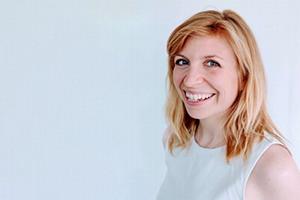Eleanor Holden talks about working in Radiotherapy Physics
Eleanor (known as Ellie) is a healthcare scientist, specialising in Radiotherapy Physics. She works part time between a clinical role at Guy’s and St Thomas’s Hospital and a FMLM Leadership fellowship at NHS England, with the Office of the Chief Scientific Officer.
- Programme
- STP
- Role
- Alumni
I entered healthcare science by enrolling on the Medical Physics stream of the NHS Scientist Training Programme (STP) in 2014, following an MSCi Physics degree at the University of Birmingham. Specialising in radiotherapy, I completed the STP in 2017 and went on to secure a permanent role in the radiotherapy department at my training host, Guy’s and St Thomas’s. As part of my MSc in Clinical Science, I undertook a research project into developing an MRI-only treatment pathway for radiotherapy prostate patients and continued the theme with an elective to The Christie, to complete research on Sarcoma treatments for one of the country’s first MR-Linacs, which I subsequently presented at an international oncology conference.
After registration I continued to be interested in the role MRI could have in the radiotherapy pathway, as well as taking a bigger interest in brachytherapy, student teaching and mentoring, and the operational side of radiotherapy physics. I also enjoy a good chunk of data analysis when given the opportunity, particularly identifying links between clinical interventions and patient outcomes to improve future patient care. Like many healthcare scientists I enjoy the prospect of good time to devote to research.
In January 2020, I embarked on what was planned as a year-long sabbatical travelling the Americas; however, the Covid-19 pandemic forced an early return to the UK at the end of March, at which point I volunteered for redeployment in the Guy’s and St Thomas’s Medical Physics department, leading to several new adventures!
In March 2020 as part of the Covid response, I was redeployed to the Clinical Engineering team at Guy’s and St Thomas’s. I worked with a small team of redeployed staff and trainees to develop new Trust-wide workstreams to manage logistics of delivery, distribution, and storage of medical equipment purchased for the pandemic response. I remained with the Clinical Engineering team for the remainder of 2020, to continue developing the medical device procurement processes. Collaborating with external stakeholders, Trust procurement and finance leads, and medical equipment management services, I applied Lean principles to develop processes which increased the oversight of Clinical Engineering over new purchases to reduce risk from unsafe devices entering the system, or devices not being managed appropriately.
I came to my current Fellowship from a 9-month secondment with the national PPE Programme, where I lead on work-streams to reduce the environmental impact of PPE. In this role I had exposure to several government departments, working most closely with policy and strategy colleagues in DHSC to review and develop the national PPE strategy, and to contribute to parliamentary questions and rolling briefs. My main objective was to coordinate efforts across the NHS to introduce several reusable PPE items, working with NHS Trusts, GPs, national IPC and central procurement. Advising on due diligence of products and appropriate device management and gathering evidence to present a case for change for the main Decision Making Committee. Whilst the wide use of PPE is hopefully reducing, I hope that my work to improve the profile of reusable alternatives and support industry to develop clinically acceptable options, will lead to a more sustainable PPE offering in the future.
Having successfully applied for the Faculty of Medical Leadership Programme’s Fellowship, I am now working at a national level on the Workforce workstream within the Office of the Chief Scientific Officer. I’m enjoying developing my understanding of the wider NHS governance and operations, and the opportunity to influence national policies on behalf of healthcare scientists.
